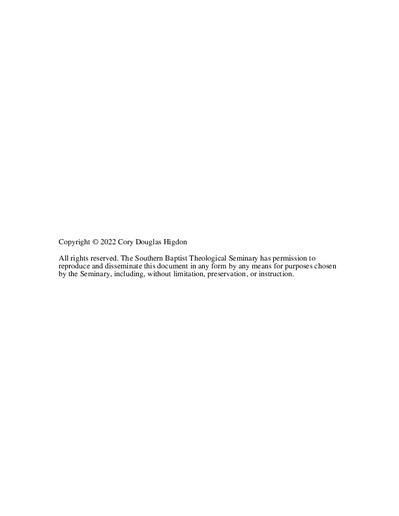| dc.contributor.advisor | Wilsey, John D. | |
| dc.contributor.author | Higdon, Cory Douglas | |
| dc.date.accessioned | 2022-05-31T19:50:46Z | |
| dc.date.available | 2022-05-31T19:50:46Z | |
| dc.date.issued | 2022-05-03 | |
| dc.identifier.uri | https://hdl.handle.net/10392/6746 | |
| dc.description | This work is embargoed until 5/18/2025. | en_US |
| dc.description.abstract | By the early 1660s, two bordering jurisdictions in colonial America enacted fundamentally divergent political communities. Massachusetts perpetuated civility of conformity, a political formulation that fastened society around a mandated theological construct, which was enforced and nourished by the civil state. Civility of conformity posited that societal stability necessitated an established orthodoxy around which citizens committed themselves. Conversely, Rhode Island’s “livelie experiment” took some of the first steps in a new political tradition called evangelical civility. Evangelical civility rooted social concord in conscientious freedom—that the surest pathway for political stability required the liberation of the soul from the coercive powers of the state while simultaneously retaining a free public square where all citizens expressed their deepest convictions. These two incompatible consortiums emerged in colonial America as the representatives of two contrasting traditions that the Protestant Reformation birthed. The magisterial tradition and the dissenting tradition provided the theological and moral support for political life in Massachusetts and Rhode Island. Soteriological assertions like justification by faith alone, the proclamation of “Christian liberty,” and the proliferation of doctrinal and denominational pluralism forced the theologians of the sixteenth and seventeenth centuries to reexamine the Christendom thesis. The contours of that delicate relationship gripped the minds of magisterial Protestants and dissenting Protestants alike, which left an indelible mark on Protestant political theology and, perhaps more importantly, provided the societal framework for American colonies like Massachusetts, Plymouth, and Rhode Island.
This contest of civility, moreover, never dissipated. On the contrary, the controversy surfaced repeatedly during the colonial period through the earliest decades of the American republic. The main question pertinent to this contest was the following: how much pluralism could a society sustain before it ruptured? This question lingers and remains unresolved as this perennial contest continues to saturate much of Western civilization and especially the American public square. Present-day disputes over religious liberty, the role of religion in the public square, and the divergences between religious rights and the right to a society free from discrimination all emerged from a centuries-old struggle over the limits of religious freedom and the civility required for human flourishing. | en_US |
| dc.subject.lcsh | Church and state--Massachusetts--History--17th century. | en_US |
| dc.subject.lcsh | Church and state--Rhode Island--History--17th century | en_US |
| dc.subject.lcsh | Freedom of religion--United States | en_US |
| dc.title | Contest of Civility: Conformity, Dissent, and the Struggle for Religious Liberty | en_US |
| dc.type | Text | |
| dc.type | Electronic dissertation | en_US |
| dc.contributor.committee | Wright, Shawn D. | |
| dc.contributor.committee | Bruce, Dustin B. | |
| dc.type.qualificationname | Ph.D. | en_US |
| dc.publisher.institution | Southern Baptist Theological Seminary | en_US |
| dc.publisher.department | School of Theology | |

